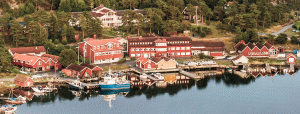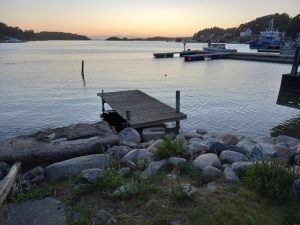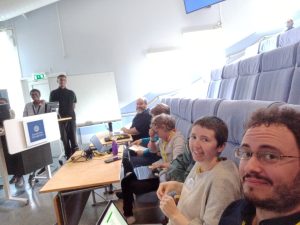When I arrived at Tjarno marine station this August, I was mesmerized by blue beaches, pleasant temperature and friendly peers. I was also greeted by an unfortunate fact though: it was the first time in years of the IMBRSea international master program that someone from the University of Bergen came to teach in a summer school…. and I cannot blame them.

Because of the rhythm in academia, more often than not these researchers are required to come at an inconvenient time of the year depending on their individual timetables. Be it because of the interruption of certain experiments or simple reduction of summer holidays, the truth is that the thought of joining these activities usually entails an added effort for our -already- overworked educators. A mandatory teaching period is not always very helpful to disconnect brains from an unfinished paper or the next grant proposal. As you will see next, however, mine was an unconventional experience. It all depends on your focus.
As an appetizer, not all people consider summer schools as a nuisance. As it happened to me, one might encounter a bunch of passionate individuals that come together to share knowledge out of pure enjoyment. These people write wonders and breath ideas like if they were ink and air, hence is a perfect opportunity to spend time with potential, optimistic people in a nurturing environment to see how they work and collaborate. As a bonus, meeting local and foreign researchers from similar or different fields increases the chances of collaborations. For PhD students it could also be an opportunity to mingle with experts of their fields of interest without the expenses that conferences entail. And that is important.

Networking normally comes at a cost: from symposiums prices to treats in a pub. In this course your daily meals, accommodation and commute are normally covered by the program. In turn one must focus on talking, helping the students, and focus on having a good time outside the office. Each of the teachers chose a different topic and it was up to the students to pick. Once the groups are formed the students design their own experiments and use the teacher as a guide, rather than an omniscient figure. They help themselves establish what their interests are within the topic and only seek our help occasionally to not get too stranded from their original question. During all this experience the teachers often talk about the students and exchange groups from time to time so everyone knows what is going on everywhere. This comes with exchange of ideas: ‘Is your people doing well?’; ‘It is interesting how they thought about their design,’; ‘How about we give it another twist?’…’. Inevitably these conversations are fruitful and new ideas appear constantly. I came out of that marine station with a bag full of names and potential collaborations for the rest of my Postdoc. I would come back without a second thought! Maybe there will be more chances in the future, and now that the first experience has passed and I more or less know my way, would you like to join me?


Be First to Comment